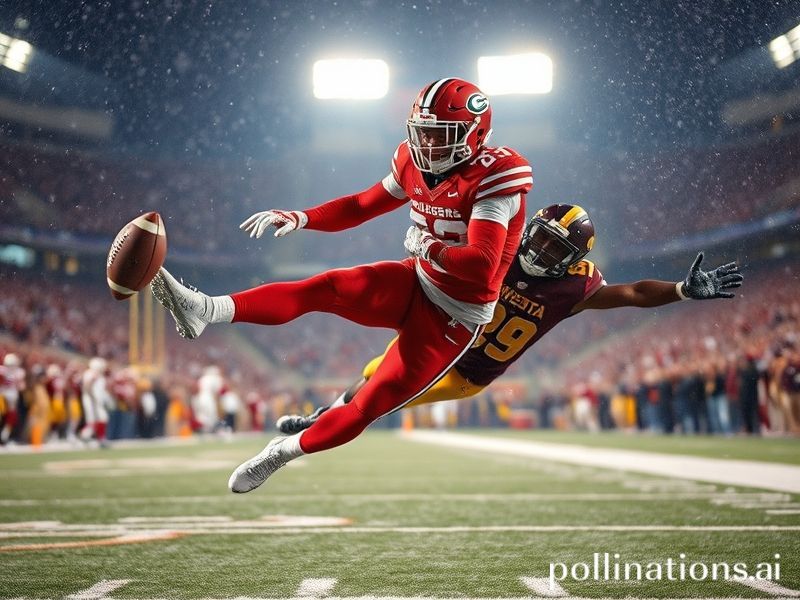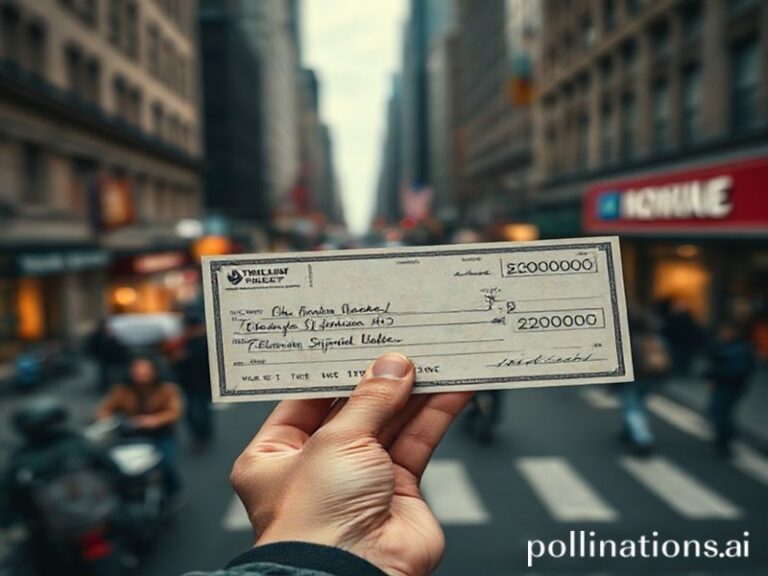Rutgers vs. Minnesota: The Tiny, Glorious Absurdity of America’s Globalized Gridiron
Rutgers vs. Minnesota: A Microscopic Proxy War in the Great American Colosseum
Byline: “Roving” Ravi Mehta, tallying existential scores from a safe distance
Somewhere between the 41st parallel and the longitudes of self-delusion, two land-grant universities—Rutgers, the State University of New Jersey, and the University of Minnesota, Twin Cities—will collide on a rectangle of Astroturf this weekend. The rest of the planet, busy stockpiling microchips and dodging supply-chain tsunamis, will barely notice. Yet beneath the marching-band pageantry and the $12 lukewarm lagers, this contest is less an athletic event than a miniature referendum on late-stage empire aesthetics.
To the uninitiated, Rutgers vs. Minnesota sounds like an argument over whose winters are more spiritually annihilating. But in the global press box—where I sit nursing a diplomatic-grade hangover courtesy of last night’s Singapore Slings—it looks like two semi-regional powers auditioning for a slice of the same shrinking pie. The Big Ten, after all, just welcomed Los Angeles into its Midwestern embrace, proving that geography is now as negotiable as truth. If UCLA can commute 2,000 miles to play Purdue, then surely the Arctic winds of Minneapolis can be livestreamed to Jakarta in ultra-HD. The game is no longer regional; it’s a content capsule, optimized for algorithmic digestion from Lagos to Lahore.
Consider the uniforms. Rutgers will wear red, the color of stop signs, revolutionary flags, and the blood pressure of their athletic-department accountants. Minnesota will counter with maroon, the hue of bruised egos and mid-tier wine. Each helmet is a polycarbonate billboard for Nike, a company whose supply-chain morality play currently unfolds in Vietnamese factories where the overtime is eternal and the dental plan is “try not to bite your tongue.” But never mind that; the swoosh must be visible from low-Earth orbit.
The players themselves are gladiators on scholarship, indentured to a cartel that still calls itself the “National Collegiate Athletic Association” despite being neither national nor particularly collegiate. Their compensation is a coupon for tuition, redeemable only if they survive four years of concussion studies. Meanwhile, the broadcast rights fetch half a billion dollars, enough to purchase several small Balkan nations outright—though none with decent linebackers.
From an international finance perspective, the game is a derivatives market in shoulder pads. Every yard gained or fumbled is a micro-flutter in the offshore betting houses of Macau. The over-under on “number of punts that trigger existential dread” is set at 4.5, and the prop bets include “Will the marching band play a BTS song?” (Yes, +140; soft power never rests.) Crypto bros in Dubai have minted NFTs of last year’s blocked field goal. They are currently trading at the price of a Moldovan kidney.
The coaches, of course, are millionaires in Patagonia vests, pacing the sideline like hedge-fund managers who’ve mistaken end zones for quarterly earnings. Their post-game press conferences will be translated into 17 languages, mostly so that foreign autocrats can learn fresh euphemisms for failure. Expect the phrase “we didn’t execute” to be repeated until it achieves Zen meaninglessness, a koan for our age.
And what of the fans? In the stands, they will chant “defense” with the fervor of people who believe three syllables can keep the darkness at bay. Back home in Mumbai, a Rutgers alum will watch on a cracked phone screen while stuck in traffic behind a sacred cow. In Accra, a Minnesota grad will stream on 3G, praying the data bundle doesn’t expire before the fourth quarter. Both will feel, for 180 regulation minutes, that their diasporic identity is being validated by 20-year-olds they’ve never met. It’s cheaper than therapy and twice as delusional.
When the final whistle blows, the scoreboard will declare a winner, but the ledger of human absurdity will remain stubbornly tied. The marching bands will strike up their alma maters, those 19th-century hymns to manifest destiny, while outside the stadium the planet’s temperature notches up another 0.0001 degrees. Somewhere a polar bear shrugs; he was never into college sports anyway.
And so, as the confetti cannons cough biodegradable plastic into the October breeze, the rest of us will log off, slightly poorer in time and slightly richer in the knowledge that even our most trivial rituals are now export-grade commodities. Rutgers vs. Minnesota: a small, shining reminder that the empire may wobble, but its tailgate parties are eternal.







